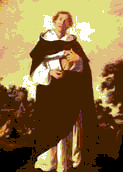Suso, Henry
Suso, Henry
Copyright © 2025 bible.booksAI.org - All rights reserved)

Suso, Henry
This 14th century Suabian friar (original name Heinrich von Berg,) was one of the chief German mystics and leaders of the Friends of God (Gottesfreunde), a circle of devout ascetic Rhinelanders who opposed contemporary evils and aspired to a close personal relationship with God.
Of noble birth, the young Suso joined the Dominicans in Constance, where five years later he experienced a profound religious awakening. Between c. 1322 and c. 1325 he was in Cologne for theological studies under Meister Eckehart, considered to be one of the greatest German speculative mystics. Suso returned c. 1326 to teach at Constance, where he wrote c. 1327 his first work, Little Book of Truth, in defense of Eckehart, who for his controversial works had been tried (1327). Suso's masterpiece is considered to be his Little Book of Eternal Wisdom (c. 1328), which subsequently became possibly the most popular religious treatise until Thomas � Kempis' (died 1471) influential Imitatio Christi. Although containing some mystical topics and theological reflections, Eternal Wisdom is essentially a practical work written in simple language.
In 1327/30 Suso was removed from his professorship for his doctrine and for his defense of Eckehart, who was condemned by the Pope in 1329. Some scholars hold that he wrote c. 1334/48 Horologium sapientie (�Clock of Wisdom�), a Latin adaptation of Eternal Wisdom, with hopes of securing Eckehart's approval. Others believe that the Horologium preceded Eternal Wisdom. He later became a well-known preacher, particularly in Switzerland and the upper Rhine. He was prior of the Friends of God in Constance (1343-44), then exiled to Diessenhofen, Switz., by the German king Louis IV the Bavarian. Before moving to Ulm c. 1347, Suso was broken by hardships, persecutions, and slander. He was beatified by Pope Gregory XVI in 1831.
Copyright © 2025 bible.booksAI.org - All rights reserved)